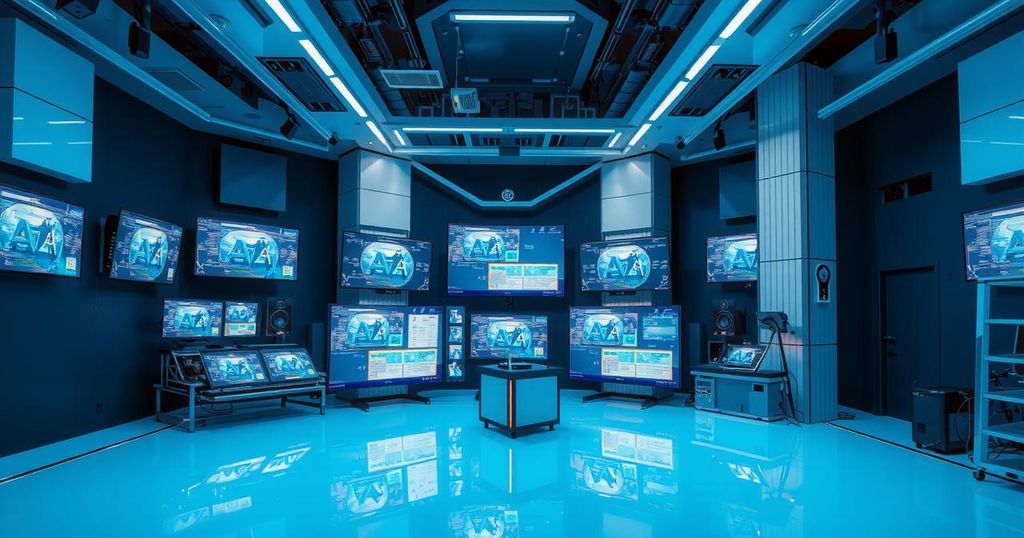How AI Is Reshaping the Film Industry: A Filmmaker’s Perspective
AI is dramatically transforming filmmaking, from scriptwriting to visual effects and marketing. Major studios use AI tools for casting decisions, predicting success, and analyzing audience preferences. However, this tech advancement raises ethical concerns regarding job security and copyright issues within the industry. The future of film lies in balancing AI capabilities with the creativity that only humans can provide.
The movie industry is undergoing a significant transformation, sparked by the advent of artificial intelligence. This shift is claimed to be the most impactful change since the introduction of sound in films. AI is not just some technological buzzword; it’s entrenched in how films are created, edited, and even marketed. From script analysis to enhancing visual effects, AI tools are reshaping filmmaking as we know it.
Big names in Hollywood are already on board. Warner Bros collaborates with Cinelytic, an AI platform that’s revolutionizing casting decisions. Meanwhile, Disney utilized the FaceDirector software in ‘Avengers: Infinity War’ to merge different actor expressions. Now, AI can even forecast box office success and provide insights into script effectiveness. Things are changing fast.
Let’s talk about storytelling—AI tools are collaborating with storytellers on this front, stretching human creativity beyond traditional boundaries. Filmmakers are now leveraging artificial intelligence not just to assist, but to enhance the creative process from the initial concept to the final cut. For instance, programs like StoryFit analyze scripts and audience reactions, offering insights that were impossible in the old days.
What’s fascinating is how AI offers customized narrative experiences, adapting to what viewers want rather than just relying on a linear storyline. It’s like having a choose-your-own-adventure book, where choices lead to unique outcomes. AI pairs stories with viewer preferences seamlessly, allowing for a richer narrative than ever before. But let’s clear this up: AI enhances storytelling, it doesn’t diminish human creativity.
Now, don’t forget about the technical stuff. AI hasn’t just upgraded the creative side; it’s like a turbocharger for the technical processes behind filmmaking. Tasks once bogged down by time and costs are now executed much faster and at a fraction of the price thanks to AI. Those complex tasks? Handled automatically, producing effects that, honestly, are almost mind-blowing.
Machine learning has made CGI incredibly lifelike, creating materials and textures as naturally as the world around us. Think back to classics like ‘The Matrix’ or ‘Toy Story’—those films paved the way for what we see now. Today, AI improves rendering times and reduces resource use without sacrificing quality, a win-win for filmmakers.
On the business side, AI is massively impacting how films rake in revenue. Studios now harness advanced analytics to market their films effectively. Gone are the days of intuition alone; AI scrutinizes viewer data and preferences, helping studios target the right audience perfectly. For instance, Movio leverages machine learning to develop detailed audience profiles, making sure no marketing dollar is wasted.
One of the breakthroughs in the film business is AI-powered box office predictions. Cinelytic arms studios with forecasting tools evaluating over 30 different factors. It’s a game-changer, allowing studios to gauge a film’s success even before it hits theaters. Balancing data with creativity is the name of the game now.
But hold on—there are hurdles to clear with AI in filmmaking, some of them quite daunting. The creativity being unleashed comes with some heavy questions about human artists’ roles. Many in the industry are voicing concerns; a recent study revealed that three-fourths of entertainment companies have integrated AI tools in ways that might cut jobs or even combine roles. With predictions indicating that AI could threaten about 204,000 jobs in the near future, anxiety is brewing.
Further complicating things, AI raises questions about ownership and authenticity. The U.S. Copyright Office notes that non-humans can’t hold copyrights. But humans can still claim copyright for AI-assisted works. Deepfakes pose additional moral quandaries, leading to legislative moves like the NO FAKES Act aimed at preventing unauthorized reproductions of individuals.
In a world where traditional profit models are upended, labor conflicts are surfacing. Recently, we’ve seen writers and actors fighting for restrictions on AI in their contracts. The landscape of the film industry is shifting fast—faster than many can keep up with.
So, where does all this leave us? Artificial intelligence is simultaneously a powerful ally and a formidable obstacle for the film industry today. Future success in filmmaking will hinge on mastering a delicate balance: harnessing AI’s potential while preserving that irreplaceable human touch.
In summary, AI can analyze scripts, generate visual effects, and even predict box office results—but it can’t replicate the emotional resonance and artistry that filmmakers tap into. The real triumph lies in navigating these changes, making AI work for storytelling, while ensuring the heart of film—human creativity—is not lost in the shuffle.
In conclusion, artificial intelligence is revolutionizing the film industry, blending technology with creativity in a way that was once thought impossible. The challenges facing human creativity and job security are critical, but by embracing the unique advantages AI provides, filmmakers can push the boundaries of storytelling while protecting the artistry that defines cinema. The future certainly looks promising, but careful navigation will be vital to keep the human element alive in this new AI-driven landscape.
Original Source: screenrealm.com




Post Comment